1,071 news posts

Frontiers news
24 Jan 2023
Frontiers partners with World Economic Forum
Frontiers has entered into a new partnership with the World Economic Forum (WEF). The gold open access publisher will join the WEF as a platform partner, formalizing a longstanding collaborative relationship between the two organizations. Photo credit: World Economic Forum As part of the new agreement, Frontiers will join the WEF’s Centre for New Society and Economy and will champion open science across the network. Supporting global initiatives in the field, Frontiers will work with its WEF partners to share and promote the evidence-based benefits of open science and to influence global thinking on its positive impact on society. Kamila Markram, Frontiers’ chief executive officer said: ‘our track record of collaboration with the World Economic Forum is one that we have long valued and becoming a Platform Partner is a natural transition for us. We share a common vision on how to address the challenges faced by society and I look forward to combining our efforts in support of this.’ As a Platform Partner, Frontiers will actively participate in the WEF’s network, embedding its expertise within the Forum’s knowledge communities and taking an active role in dialogues and summits. This will build on Frontiers’ previous work with the WEF, which […]
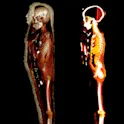
Featured news
24 Jan 2023
‘Golden boy’ mummy was protected by 49 precious amulets, CT scans reveal
By Mischa Dijkstra, Frontiers science writer The ‘Golden boy’ digitally unwrapped, stepwise. Image credit: SN Saleem Scientists used CT scans to ‘digitally unwrap’ the approximately 2,300-year-old undisturbed mummy of a teenage boy of high socioeconomic status. The body was equipped with 49 amulets of 21 different types, many of which were made of gold, which had been carefully placed on or inside the body. These included a two-finger amulet next to the uncircumcised penis, a golden heart scarab placed inside the thoracic cavity, and a golden tongue inside the mouth. He was clad in sandals and garlanded with ferns, with ritual significance. This mummy is a showcase of Egyptian beliefs about death and the afterlife during the Ptolemaic period. The ancient Egyptians believed that when we died, our spiritual body sought out an afterlife similar to this world. But entry into this afterlife wasn’t guaranteed: it first required a perilous journey through the underworld, followed by an individual last judgment. For this reason, relatives and embalmers did everything they could to ensure that their loved one might reach a happy destination. Here, scientists from Egypt used computerized tomography (CT) to ‘digitally unwrap’ the intact, never-opened mummy of a 2,300-year-old teenage […]
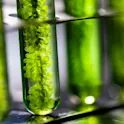
Featured news
19 Jan 2023
Microalgae could be the future of sustainable superfood in a rapidly changing world, study finds
By Peter Rejcek, science writer The global population recently hit eight billion people. Yet climate change and human environmental impacts threaten our long-term food security. Researchers at the University of California, San Diego, recently published a scientific review demonstrating that microalgae and other microscopic, plant-like organisms could help feed the world’s growing population more sustainably than current agricultural systems. Algae. It’s what’s for dinner. This variation on the iconic US advertising slogan from the beef industry may sound funny, but it’s no joke that the current agriculture system is a major source of greenhouse gas emissions and environmental pollution. In turn, the climate crisis and ecosystem degradation threaten long-term food security for billions of people around the world. Researchers at the University of California, San Diego (UCSD), believe algae could be a new kind of superfood thanks to its high protein and nutrition content. They make their case in a paper recently published in the journal Frontiers in Nutrition that examines the current scientific literature on microalgae, a catch-all term for the thousands of microscopic algal species and other photosynthetic organisms like cyanobacteria found in various aquatic environments. A more efficient food source The review highlights the current technologies for […]

Engineering
17 Jan 2023
From pylons to pandas: 5 Frontiers articles you won’t want to miss
by Angharad Brewer Gillham, Frontiers science writer Image/Shutterstock.com At Frontiers, we bring some of the world’s best research to a global audience. But with tens of thousands of articles published each year, many often fly under the radar. Here are just five amazing papers you may have missed. Building better-looking pylons Pylons help support essential amenities – but they can be an eyesore. Italian scientists led by Dr Luca Di Angelo at University of L’Aquila investigated the best way to build a pylon with less visual impact on the landscape. As visual impact is subjective, reducing it requires consultation with residents who will see the pylons every day. But designs invented by residents without technical knowledge may not be able to meet safety standards. Di Angelo and colleagues used the development of new electrical pylons in the coastal regions of Italy to test a novel method of integrating visual impact minimization with the design process. They identified shapes which were related to the geography and culture of the area and streamlined enough for pylon design, and surveyed Italians from different coastal regions to determine which shapes were considered most recognizable and representative. A sail was chosen, and models were developed […]
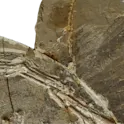
Earth science
17 Jan 2023
Rare fossilized feathers reveal secrets of paleontology hotspot during Cretaceous period
by Angharad Brewer Gillham, Frontiers science writer Fossil STM 15-36, photographed by Xuwei Yin at the Shangdong Tianyu Museum of Natural History. Photograph courtesy of the authors. Rare preserved soft tissue – feathers from early Cretaceous birds at Jehol Biota – sheds new light on the world in which they died, millions of years ago. The site of Jehol Biota in China is famous for stunning fossils which preserve soft tissue – skin, organs, feathers, and fur. These fossils offer rare insights into the evolution of characteristics like flight, but they need careful interpretation to understand what the soft tissue looked and behaved like in life, and how decomposition may have affected it. A study published in Frontiers in Earth Science analyzed five fossils of an early Cretaceous bird, Sapeornis chaoyangensis, in order to study how the environment they were buried in changed the preservation of their soft tissue. “Jehol Biota provides the most informative source for understanding Mesozoic ecology,” said corresponding author Dr Yan Zhao, based at the Institute of Geology and Paleontology, Linyi University. “Better understanding of the diverse taphonomy of Jehol terrestrial vertebrates can help us finally understand more about the past and future of biological evolution.” […]

Frontiers news
16 Jan 2023
Rachel Parker – They are the answer
Author: Carolina Capelo Garcia Rachel Parker is a Senior Research Fellow at the Australian Council for Educational Research (ACER). She has more than 20 years of experience in international education, including specific expertise in learning through play and global education. More specifically, Rachel has been leading, designing, evaluating, and managing education programs for development partners such as UNICEF, Australia’s Department of Foreign Affairs and Trade (DFAT), the Asian Development Bank, and the World Bank. Through ACER, Rachel leads Learning Through Play at School, a major four-year study on the benefits of playful pedagogies, as part of a joint project with the LEGO Foundation. She is also co-author of Frontiers in Education’s most viewed article of 2022, “Learning Through Play at School – A Framework for Policy and Practice” (Parker et al, 2022). Photo credit: Simone Norris What drove you to follow the path of education research, and more particularly, how did you end up exploring the importance of learning through play at an international level? “What drove me to education research was my curiosity. I also had this naïve desire to want to make a positive difference in the world. Before I worked in research, I worked in international development […]

Climate action
16 Jan 2023
Our toilets can yield excellent alternatives for widespread polluting fertilizers
By Mischa Dijkstra, Frontiers science writer Scientists show that the yield of cabbages grown on soils supplied with two modern nitrified urine fertilizers recycled from human urine is approximately equal to the yield when soils are fertilized with commercial vinasse. The exclusive use of compost recycled from human feces gave a slightly lower yield, but such compost is expected to give extra carbon to soils when combined with nitrified urine fertilizers. Importantly, pharmaceuticals in feces ended up in the edible plant parts only in negligible amounts, implying that fertilizers recycled from human excreta are not only productive but also safe. To tackle the climate crisis, biodiversity loss, and pollution, humanity will need to move to a circular economy, where all resources are recycled. Why not recycle our own body waste too as fertilizer, provided there is no risk that harmful microbes or traces from pharmaceuticals end up in the consumed crops? Most nutrients needed for plant growth occur in human urine and feces. Urine is especially rich in nitrogen and potassium, and also contains trace amounts of metals such as boron, zinc, and iron. Feces could in theory supply other nutrients such as phosphorus, calcium, and magnesium or valuable organic […]

Featured news
12 Jan 2023
Simple blood test shows promise for screening common and dangerous pregnancy complications
By Angharad Brewer Gillham, Frontiers science writer Image/Shutterstock.com Scientists find that short-chain fatty acids in blood can be used as biomarkers in testing for dangerous pregnancy complications such as pre-eclampsia, gestational diabetes and intrahepatic cholestasis of pregnancy. Scientists at Ningbo University, China have identified biomarkers that could provide an early warning system for three common and dangerous pregnancy complications: pre-eclampsia, gestational diabetes, and a liver condition called intrahepatic cholestasis. All three conditions are dangerous; early diagnosis and treatment is key to preventing poor outcomes and lifelong consequences. Their causes are not fully understood, and nor is their connection to the gut microbiome, which is affected by pregnancy and pregnancy-related conditions. A team led by Dr Siqian Chen at the Affiliated Hospital of Medical School decided to investigate whether specific changes in the microbiome — detected using levels of short-chain fatty acids, metabolites which are produced following the fermentation of microbiota — could be used as biomarkers for pregnancy complications. “We analyzed and correlated the distribution of short-chain fatty acids during normal pregnancy and during three specific types of complicated pregnancy, gestational diabetes, pre-eclampsia, and intrahepatic cholestasis,” said Dr Rongrong Xuan, senior author of the study, published today in Frontiers in […]
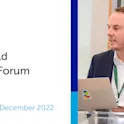
Featured news
09 Jan 2023
Science platform Frontiers at the World Science Forum in Cape Town
Inaugurated in 2003, the World Science Forum series fosters and maintains a dialogue between the scientific community, society, policymakers, and industry. Arriving from over 100 countries, around a thousand leading scientists, decision-makers from the world of politics, industry, representatives of civil society, and the media express their views on the new challenges facing science in the 21st century. In December, the World Science Forum 2022 was hosted in Cape Town under the theme “Science for Social Justice”. Taking place in Africa for the first time, the gathering deliberated on the social and economic relevance, influence, and responsibilities of science and covered the topics like climate change, science for human dignity, the Sustainable Development Goals, science for Africa, and science diplomacy. The list of notable speakers included, among others, the Minister of Higher Education, Science and Innovation in South Africa Dr Blade Nzimande, co-chair of the Global Young Academy Prof Roula Inglesi-Lotz, president of the Hungarian Academy of Sciences Prof Tamás Freund, president of the African Academy of Sciences Prof Felix Dakora, president of the International Science Council Sir Peter Gluckman, assistant director-general for Natural Sciences at UNESCO Dr Shamila Nair-Bedouelle, and president of Jordan’s Royal Scientific Society Princess Sumaya […]

Featured news
09 Jan 2023
Eating almonds daily boosts exercise recovery molecule by 69% among ‘weekend warriors’
By Mischa Dijkstra, Frontiers science writer A new randomized controlled trial showed that participants who daily ate 57g almonds over four weeks had a 69% higher level of the beneficial oxylipin molecule 12,13-dihydroxy-9Z-octadecenoic acid in their blood after a 90 minute session of eccentric exercise than control volunteers. In contrast, they had a 40% lower level of the mildly toxic 9,10-Dihydroxy-12-octadecenoic acid in their blood after exercise than control participants. The authors conclude that daily consumption of almonds changes the metabolism to recover faster after strenuous exercise. For those who exercise regularly, eating almonds each day might be the ideal new year’s resolution. A randomized controlled trial in Frontiers in Nutrition showed that female and male participants who ate 57g almonds daily for one month had more of the beneficial fat 12,13-dihydroxy-9Z-octadecenoic acid (12,13-DiHOME) in their blood immediately after a session of intense exercise than control participants. This molecule, a so-called oxylipin (oxidized fat) is synthetized from linoleic acid by brown fat tissue, and has a beneficial effect on metabolic health and energy regulation. Corresponding author Dr David C Nieman, a professor and director of the Appalachian State University Human Performance Laboratory at the North Carolina Research Campus, said: “Here […]
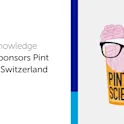
Frontiers news
21 Dec 2022
Thirst for knowledge: Frontiers sponsors Pint of Science Switzerland festival
Open access publisher Frontiers is proud to sponsor Pint of Science Switzerland taking place 22-24 May 2023. The event is part of the larger global Pint of Science festival, which aims to make science more accessible by sharing recent scientific developments with the public in a casual atmosphere. Among the host cities are nine from across Switzerland, including Basel, Geneva, Lausanne, and Zurich. Photo credit: Pint of Science Switzerland The annual three-day festival brings scientists to local bars, pubs, and other venues in cities around the world to connect with the community. Rather than a series of formal talks, Pint of Science offers multiple stages across each city with experts from various disciplines. Each night features a unique line-up of talks, demonstrations, and live experiments. Through the interactive nature of the event, attendees can directly engage with the host and speakers as they learn more about the latest scientific discoveries. The topics covered span from astronomy and the arts to neuroscience and zoology. Frontiers has sponsored the Pint of Science Switzerland festival for several years. Despite 17 locations worldwide, Switzerland is home for the company with its headquarters in Lausanne. Frontiers is passionate about supporting initiatives that center around people […]

Featured news
20 Dec 2022
Lonely heart-failure patients face worse outcomes than sociable peers
by Tania Fitzgeorge-balfour, science writer Social frailty, which includes the loss of social roles, social networks, and social activities, is widely identified as a risk to healthy aging. A new study is the first to show a close association between the loss of perceived social role amongst friends and family and poor clinical outcomes for older heart failure patients. These findings suggest that social engagement and activities should form part of the aftercare program for these patients. Older heart failure patients who feel that they have lost their social role amongst friends and family are more likely to suffer poor clinical outcomes. This is the finding of a new study in Frontiers in Cardiovascular Medicine that has examined the specific aspects of social interaction that can lead to a poor prognosis for these patients. “We are the first to show a close association between the loss of perceived social role and long-term poor clinical outcomes in older heart failure patients,” said Dr Satoshi Katano, first author of this research, based at Sapporo Medical University Hospital, Sapporo, Japan. “Our study highlights the real need to develop a management program that includes a social approach to the care of these patients.” Read […]
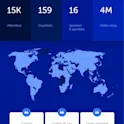
Frontiers news
19 Dec 2022
A year of transformational science at the Frontiers Forum 2022
Our Frontiers Forum webinar series welcomed over 14,000 attendees this year, who joined visionary keynote speakers and panelists for discussions on science-led solutions for healthy lives on a healthy planet. The Frontiers Forum brings together researchers, policymakers, and other experts from around the world to explore the latest data and fresh perspectives for addressing the greatest challenges of our time. This year, the speakers and panelists included a Nobel prize winner as well as representatives from the World Health Organization, African Academy of Sciences, and leading conservation organizations. Subjects ranged from exciting developments in CRISPR gene-editing technologies to new approaches for protecting biodiversity and ecosystems, particularly in the face of climate change. Thank you to everyone who joined our 2022 virtual Forum sessions, and for your enormously positive feedback. And keep an eye out for our 2023 line-up, featuring further groundbreaking research and expert discussions from visionary thinkers across all areas of science and society. Watch (or re-watch!) the sessions via the links below. 2022 Speakers Jump to: Prof Jennifer Doudna | The CRISPR health revolution Prof Marks Adams | Extinguishing the wildfire crisis Prof Johan Rockström | A safe and just future within planetary boundaries Prof Ove Hoegh-Guldberg | […]

Featured news
16 Dec 2022
Screening a puppy’s DNA methylome may help predict how energetic or fearful they will be
By Mischa Dijkstra, Frontiers science writer Scientists found that differences in the epigenome, in particular the DNA methylome, are predictably associated with differences in the temperament of dogs, especially their energy and fearfulness. The DNA methylome predicted these traits better than Single-Locus Polymorphisms or age. In future, breeders could screen the epigenome of puppies to find the best candidates for companion or service dogs. Anyone who’s ever had a dog knows how different one can be from another. For example, they can be reserved or friendly, playful or calm, fearful or bold, and prone to bark or fetch or not. Research has shown that some of these differences are genetically determined. But even within dog breeds, where line breeding and artificial selection have led to the loss of much of the original genetic variation, the behavior of individuals can differ widely. Now, researchers show that part of the differences in temperament – in particular their ‘energy’ level and fear-related behaviors – depend on acquired differences in the epigenome. The epigenome, an individual’s unique set of chemical tags on DNA and its associated histone complexes (nucleosomes), can dial the expression of local genes up or down. Because the epigenome is known […]
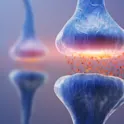
Featured news
15 Dec 2022
Five articles you need to check out on the future of neurology research
By Colm Gorey, Frontiers Science Communications Manager Image: Shutterstock.com In an ever-changing field of research such as neurology, it can be difficult to keep up with the latest breakthroughs. Now at Frontiers, we highlight just three of the latest research articles to shed more light on how the mind works. The human brain is an organ that has fascinated our species for centuries, with vast amounts of research so far yielding a wealth of discoveries. However, so much of how the brain works remains a mystery waiting to be solved. In 2022, Frontiers published one of the biggest neurological research breakthroughs of the year with the discovery that life may indeed flash before our eyes as we die. However, this was just one paper of thousands published by Frontiers this year that helped set the groundwork for new neurological discoveries, ranging from multiple sclerosis to deep brain stimulation. Five such articles are essential reading to anyone looking to learn more about neurology were published as part of the research topic ‘Horizons in Neurology’. The Neuroimmunology of Multiple Sclerosis: Fictions and Facts There have been tremendous advances in the neuroimmunology of multiple sclerosis (MS) over the past five decades, which have […]